Big Red Book
Celebrating television's This Is Your Life
Billy WRIGHT CBE (1924-1994)
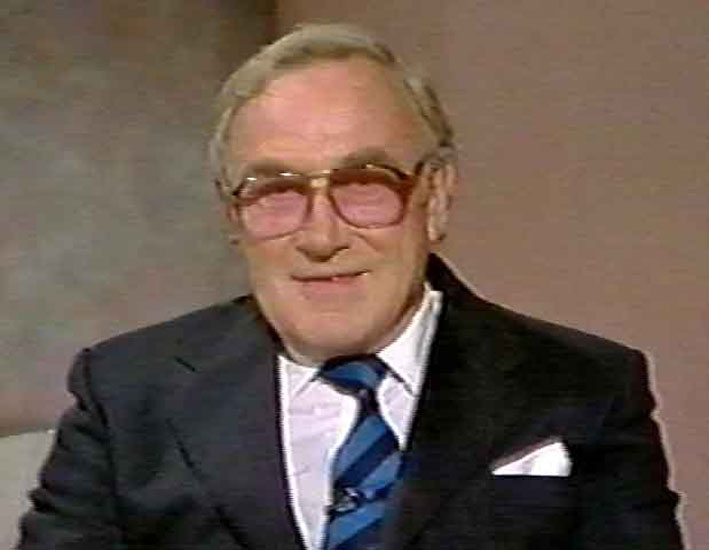
THIS IS YOUR LIFE - Billy Wright, former footballer, was surprised by Michael Aspel at Thames Television's Teddington Studios, having been led to believe he was there to appear in a programme about the children of famous people following in their parents' footsteps.
Billy, who was born in Ironbridge, Shropshire, spent his whole playing career at Wolverhampton Wanderers FC and, as club captain, led the team to victory in the First Division title three times. As the first footballer in the world to earn 100 international caps, Billy also holds the record for the longest unbroken run in competitive international football, with 105 appearances for England.
Billy retired from playing in 1959 and became manager of England's youth team the following year before being appointed manager of Arsenal FC in 1962. After leaving management, he became a television pundit and Head of Sport for ATV and Central Television before retiring in 1989.
Billy Wright was a subject of This Is Your Life on two occasions – previously surprised by Eamonn Andrews in May 1961 at the EMI Studios in London's St John's Wood.
"You're joking! Cor, you terrors! Surprised? Yeah, I really am. Shocked, in fact!"
programme details...
- Edition No: 770
- Subject No: second timer
- Broadcast date: Wed 17 Jan 1990
- Broadcast time: 7.00-7.30pm
- Recorded: Wed 13 Sep 1989
- Venue: Teddington Studios
- Series: 30
- Edition: 13
- Code name: Left
on the guest list...
- Joy Beverley - wife
- Teddy Beverley - sister-in-law
- Babs Beverley - sister-in-law
- Hayley - granddaughter
- Vincent - son
- Laurence - brother
- Tom Finney
- Wilf Mannion
- Babette - daughter
- Vicky - daughter
- Sasha - niece
- Tommy Cannon - live link
- Bobby Ball - live link
- Arthur Russell
- Lawrence Cullis
- John Norry
- Raich Carter
- Bobby Moore
- Eddie Hopkinson
- Jimmy Armfield
- Ronnie Clayton
- Ron Flowers
- Warren Bradley
- Derek Kevan
- Johhny Haynes
- Joe Baker
- Ken Friar
- Gary Newbon
- Andy Allan
- Chris Tarrant
- Lev Yashin Filmed tributes:
- Stan Cullis
- Bobby Charlton
- Peter Shilton
- Jimmy Greaves
- Iain St John
related appearances...
- The Beverley Sisters - Dec 1969
- Kevin Keegan - Feb 1979
- Emlyn Hughes - Feb 1980
- Jackie Milburn - Dec 1981
- Tom Finney - Nov 1988
- Nat Lofthouse - Apr 1993
production team...
- Researcher: Louise Clover
- Writer: Norman Giller
- Directors: Brian Klein, Paul Kirrage
- Associate Producer: John Graham
- Producer: Malcolm Morris
- names above in bold indicate subjects of This Is Your Life
first tribute
tackling football's top names
keeping it in the family
surprised again!
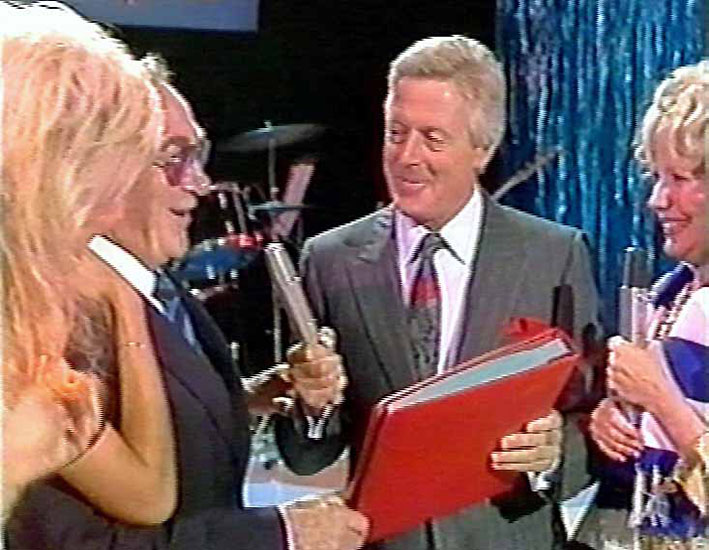


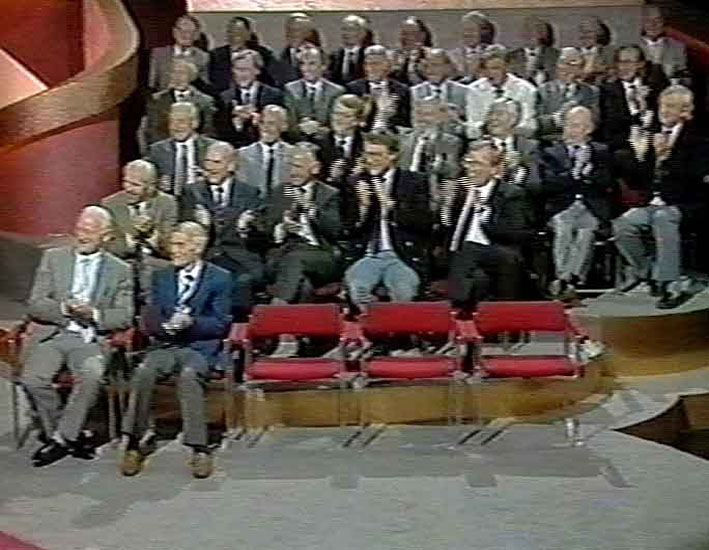

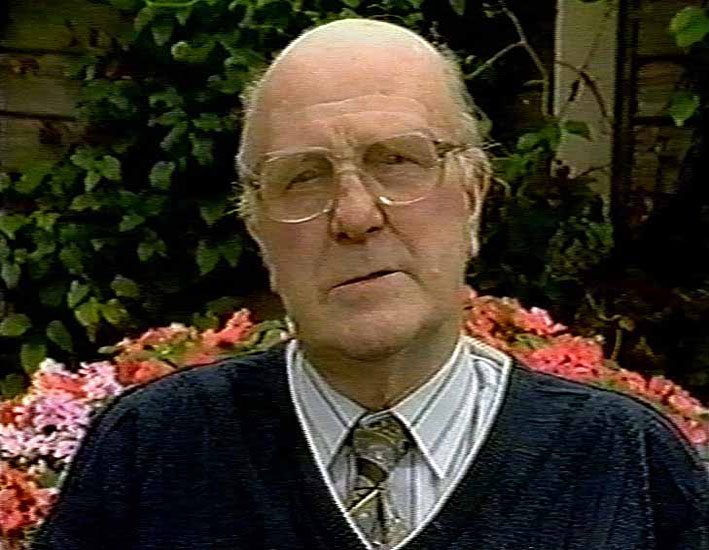
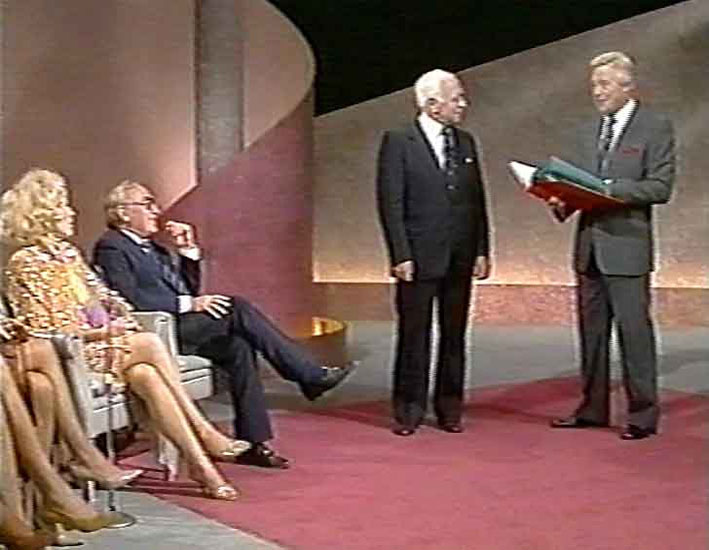
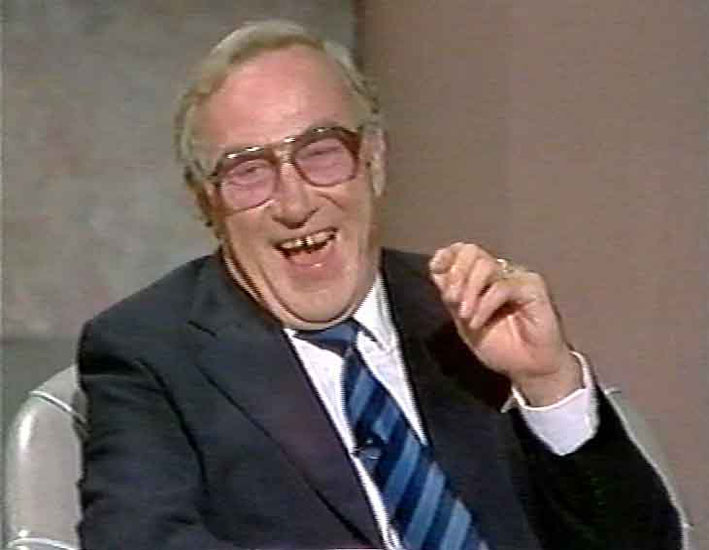
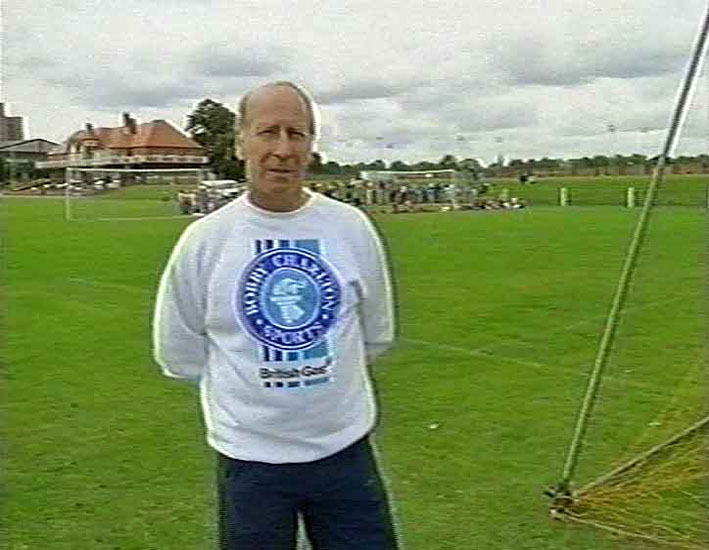
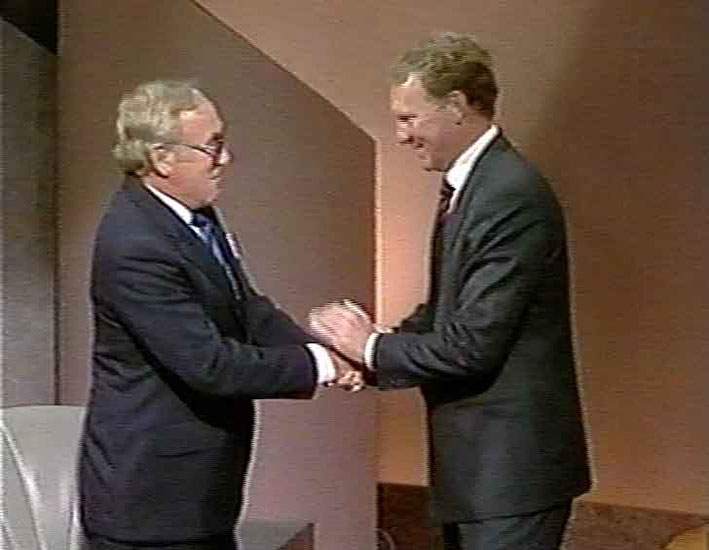
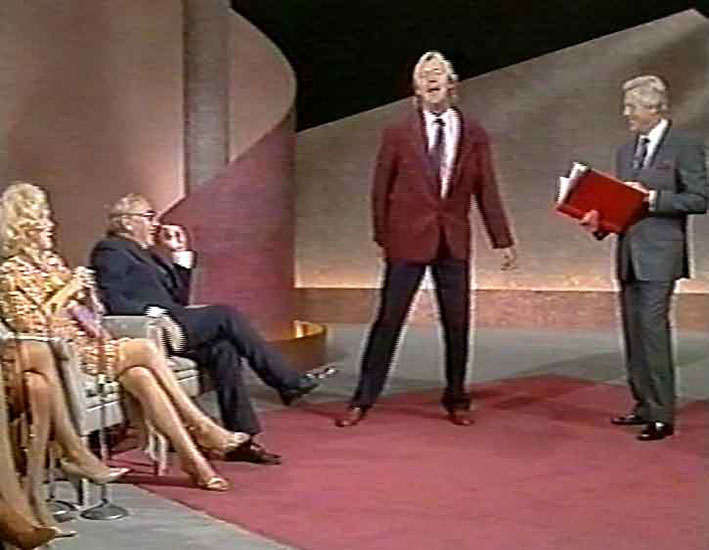
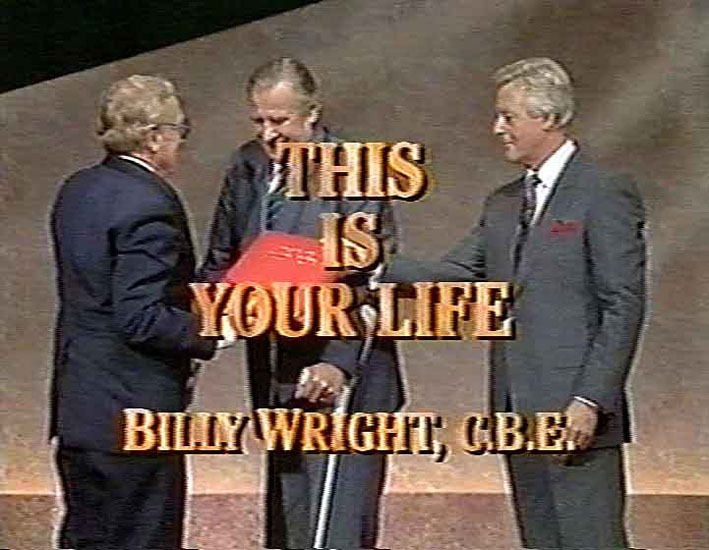
Screenshots of Billy Wright This Is Your Life
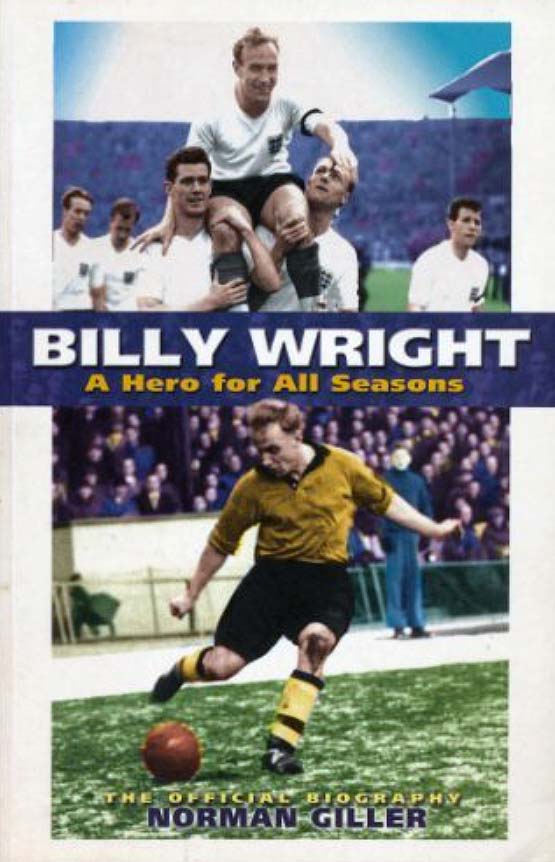
What was the young Billy Wright like, and how had his army experiences changed him? For the answers, I went to the man who knew him better than anybody else: the redoubtable Stan Cullis.
When I was commissioned to script Michael Aspel's This Is Your Life tribute to Billy in 1989, I journeyed to the Worcestershire retirement home of Stan Cullis, who in Wolverhampton football folklore stands just as big a giant as Billy himself. I made the trip with some apprehension, because in my young reporting days I used to go in fear and trembling to interview 'Mr Cullis' in his oak-panelled office at Molineux.
He had the reputation for eating young reporters for breakfast, and in the early 1960s I found him an intimidating subject at a time when Wolves were, quite shamefully, plotting his removal. But nearly 30 years on the Cullis I found, seated and relaxed in his favourite armchair and looking out at a beautifully manicured garden, was mellowed almost beyond recognition. When I brought up the name of Billy Wright he beamed as a myriad of memories queued for attention. 'A lovely, lovely man' was his instant appraisal.
'You were captain of Wolves when he first arrived at Molineux as ground staff boy in 1938,' I reminded him. 'What was the young Billy like?'
'He was as quiet as a church mouse and you wouldn't have known he was there if it had not been for his distinctive blond thatch,' Cullis said, almost instinctively rubbing his own famous bald dome that had been as much a trademark as Billy's blond hair. 'We nicknamed him Snowy...'
...Now docile in retirement, he looked out of the window at the lawn as if it was the Molineux pitch on which he and his teams tasted such heady wine of success. 'I'm sorry,' he said, 'I know I'm not giving you the material you need. It would be better for your television programme if I could come up with some startling stories about Billy, but he was a model professional. What I can tell you is that Wolves and England had no greater servant. He gave one hundred and ten per cent.'
The great man's speech was just starting to slow, heralding the illness to which he would finally succumb at the age of 84 in February 2001. 'I am paying the price for all that heading of a muddy leather ball and physical wars with centre-forwards,' he said. 'But I would not change a thing. There was nothing to beat playing the game at the top level. I had a lot of success as a manager with Wolverhampton, but doing it out on the pitch was much more satisfying than planning it.'
Suddenly his eyes lit up as he plucked a memory from the cellar of his mind. 'I think I have a Billy Wright anecdote for you,' he said, almost in triumph. 'We had held Real Madrid to a 2-2 draw at the Bernabeu in 1957 when Real were the virtually unchallenged kings of Europe. There was an after-match banquet and I ordered the players to be on the team coach immediately afterwards, but half a dozen were missing when we returned to our hotel, including the captain. I confronted him at breakfast the next morning and demanded to know why they had missed the coach. 'We noticed there was a night club show in the hotel where the banquet was held,' he said, 'and decided on the spur of the moment to go and watch it.' Billy was braced for a volley from me, and I think you could say he was speechless when I replied, 'I'm really hurt that you didn't tell me because I would liked to have seen the show, too.'
He laughed out loud at the suddenly uncorked memory. Mr Cullis in a nightclub? It was like trying to imagine the Archbishop of Canterbury in a Soho strip joint. This was the nearest he and I could get to evidence of Billy Wright the footballer misbehaving.
There was a parting shot from the old Master of Molineux. 'I knew Billy wouldn't make it as a manager,' he confided. 'He was far too nice. You need a ruthless streak and the skin of a rhinoceros. Billy liked to be liked, but you just cannot be a football manager and also popular with everybody. The players will eat you alive if you are too nice.'
So Billy did have warts. He was too nice. Hold the front page!
The Cullis contribution to Billy's This Is Your Life ended up as a 30 second tribute to camera, but he was so sincere with his comments that Billy could not stop tears welling in his eyes. 'I owe that man so much,' he told Michael Aspel. 'He was Mr Wolves.'
While gathering material for Billy's This Is Your Life tribute, I asked Sir Walter Winterbottom for his assessment of the man he selected as Captain 90 times. 'Well,' he said, 'for a start let me say that I considered myself fortunate to have Billy to call on so often. He had a heart of oak, and was the most reliable of men. He filled the players around him with confidence and enthusiasm. Billy was a good listener and could take on board tactical plans, and then help to put them into operation out on the pitch. You could count his below-par performances in one hundred and five international matches on the fingers of one hand. He was an authorative right-half and then, because his country needed him, he moulded himself into an exceptional centre-half. English football has not had a better servant.'
Series 30 subjects
Omar Sharif | Sarah Brightman | Yvonne Cormeau | Cyril Smith | Jean Boht | Zsa Zsa Gabor | Alec McCowen | Barbara CartlandDouglas Fairbanks Jr | William Shatner | Barbara Taylor Bradford | Elizabeth Dawn | Billy Wright | Trevor McDonald
Stephanie Beacham | Simon Weston | Peter Scudamore | Peter Cushing | David Shepherd | Harry Secombe
Nigel Kennedy | Eluned Williams | Billy Marsh | Bob Holness | Bobby Davro | Michael Baldock | Ken Dodd